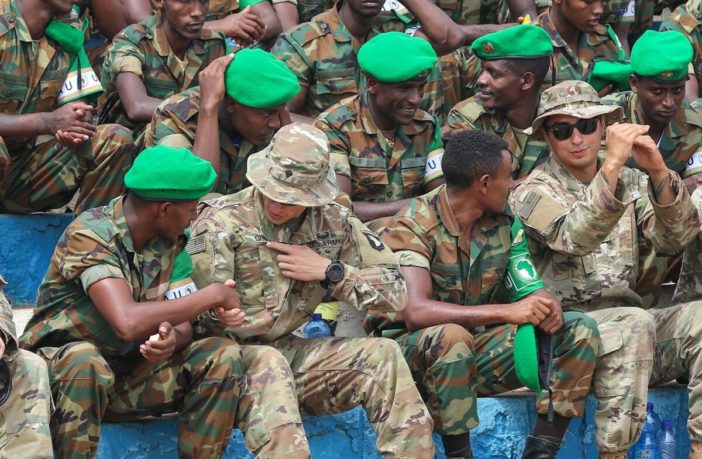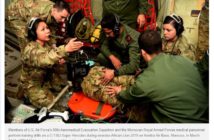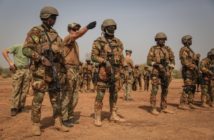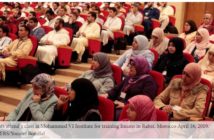Army Times
By: Kyle Rempfer
U.S. and Ethiopian troops introduce themselves before the field training exercise portion of Justified Accord 2019 at the Hurso Training Center near Dire Dawa, Ethiopia, July 16, 2019. (Sgt. Aubry Buzek/Army)
U.S. Army Africa has big plans for the coming years, as they look to take African Lion — an exercise previously owned by the Marine Corps — and make it the biggest on the African continent in spring 2020.
U.S. Marine Corps Forces Europe and Africa has owned the exercise for the past 16 years. But now, Army Africa will be assuming responsibility for the planning and execution of African Lion, which will take place at the end of March and early April.
“It was a transition year this past year. This is the first year that we are truly in the lead,” Maj. Gen. Roger Cloutier, U.S. Army Africa commander, said in an interview with Army Times.
“To be quite honest, it has been going down in scope over the years and being reduced,” Cloutier said. “We saw it as an opportunity.”
Cloutier envisions the exercise as an opportunity to not only develop partner capacity, but to build readiness for the U.S. forces that participate. At the end of African Lion 2019, Cloutier and his staff met with key players and began to develop a different concept of operations that would bring the exercise into much more of a multi-domain focus.
“For example, in this upcoming exercise, we are going to be jumping in a battalion task force alliance out of the 173rd Airborne Brigade here in Italy,” Cloutier explained. “That is going to allow them to exercise their rapid deployment capabilities and do parachute assault. In my role as a senior responsible officer in Italy, it will allow me to exercise Vicenza [northeastern Italian city] as a power projection platform.”
/arc-anglerfish-arc2-prod-mco.s3.amazonaws.com/public/NWNJPN6NWFCKLO5LQZYOUVNSRM.jpg)
Members of the U.S. Army’s 2nd Brigade Combat Team, 101st Airborne Division, Moroccan special operations forces, and the British Army’s 4 Rifles, Bravo Company, begin a room-clearing drill during the field training exercise portion of exercise African Lion 2019 in Tifnit, Morocco, March 26, 2019. (Deanna C. Gonzales/Navy)
African Lion is being envisioned as a multi-domain, complex training exercise that includes NATO allies and takes place in four countries: Tunisia, Morocco, Senegal and Spain.Sign up for the Army Times Daily News Roundup
Don’t miss the top Army stories, delivered each afternoonSubscribe
In addition to the airborne operations, the re-imagined African Lion will involve theater and strategic logistics planning, naval gunfire, special operations forces and even bombers and fixed wing assets out of Europe, according to Army Africa’s commander.
“This is going to be a no-kidding multi-domain complex exercise that people build readiness in,” Cloutier said. “We are going to do very complex logistics and open the theater in three different countries.”
/arc-anglerfish-arc2-prod-mco.s3.amazonaws.com/public/FZGSF23JYVD37KLIXAMRREABFI.jpg)
Why this US general says Russian Wagner mercenaries in Africa ‘concern me greatly’
The incoming head of U.S. Africa Command has dealt with Russian mercenaries before during his time in Syria, and is planning to look into their operations on the African continent in his new role.By: Kyle Rempfer
This past year, Army Africa still did “the heavy lifting, but we were falling in on kind of a Marine Corps plan and methodology,” Cloutier noted.
“We are still working on the forces that are going to show up,” he added. “It will be two to three times bigger than it was last year. My intent is for this to be the largest exercise that takes place on the African continent.”
During the 2019 African Lion exercise, there were 2,500 participants. Troops from Senegal, Morocco, Tunisia, Senegal, Spain, France, Canada, the United Kingdom and the United States participated.
/arc-anglerfish-arc2-prod-mco.s3.amazonaws.com/public/FEQRXBHOBFGUVFXYCJQZ364EW4.jpg)
U.S. soldiers with the 2nd Brigade Combat Team, 101st Airborne Division run through squad battle drills with a member of the Rwanda Defence Force during Exercise Shared Accord in Gabiro, Rwanda on Aug. 20, 2019. (Sgt. Heather Doppke/Army)
Cloutier also met with the chiefs of various armies during the 2019 African Land Forces Summit this summer in the southern African nation of Botswana.
The summit has representatives from 41 countries. It served as an opportunity to discuss issues and solutions for problems that they see currently in Africa.
“These are common problems that everybody is facing,” Cloutier said. “Most importantly, it was an opportunity to develop relationships. … It makes it much easier to open doors, to pick up the telephone and call a land forces commander in a specific country and get a lot of things done fairly quickly that we could not do in the past.”
Building those relationships is important for the United States. The African continent has a population of nearly 1.3 billion people. By 2050, it is expected to grow to about 2.4 billion.
“About 40 percent of the world’s population growth between now and 2050 is going to occur on the African continent,” Cloutier said. “By 2050, one out of every four people in the world will be African. It is a super young population. There is a youth bulge. They have six of the ten fastest growing economies in the world in Africa.”
/arc-anglerfish-arc2-prod-mco.s3.amazonaws.com/public/HMQ2RMOOPVF7JJSNKJGIAW657M.jpg)
A member of the Dutch Army uses a sand table to give feedback to members of the Rwanda Defence Force following their run of convoy operations training as part of Exercise Shared Accord 2019, in Gabiro, Rwanda Aug. 23, 2019. (Sgt. Heather Doppke/Army)
China and Russia are heavily invested on the continent, building infrastructure, bridges and roads. But they’re also involved in the defense sector.
Russian mercenaries from the Wagner Group — a private military company with deep Kremlin connections — have been active across the continent. They offer African governments training and equipment much like U.S. troops would, but without human rights oversight, American officials said during a Senate Armed Services Committee hearing in April.
“They’re a quasi-military and as we saw play out in Crimea and Ukraine, little green men running around, not necessarily following rules or behavior we would expect from proper armies,” Gen. Stephen J. Townsend, who helms U.S. Africa Command, said during the hearing. “So I have a pretty significant concern for the use of these kinds of forces and the way that the Russians are using them on the continent.”
Cloutier said he has seen both Russian and Chinese military personnel on the African continent in different capacities.
Competing for partnership in Africa fits well into the 2018 National Defense Strategy, which prioritized a shift of U.S. military attention away from fighting insurgencies and toward competing against peer adversaries.
African partners are receptive to American trainers, even when they have long-term relationships with others, according to Cloutier. He recounted a conversation he had recently with a senior official from an African country, the name of which he said he would withhold.
“He told me, ‘hey look. We have had a long-standing relationship with another country for a long time. We feel like the world is passing us by,’” Cloutier said. “’We are looking for something new. We are looking for something new to be with the United States.'”
“There is an example of great power competition in the context of the NDS,” Cloutier added.
In that specific case, the country the African nation had a long-standing relationship with was Russia, Cloutier confirmed.397About
this
AuthorAbout Kyle Rempfer
Kyle Rempfer is a staff reporter for Military Times. He previously served an enlistment in U.S. Air Force Special Tactics. Kyle’s reporting focuses on the Department of the Army.







